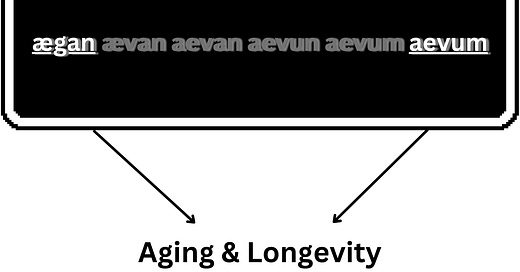Aging and Longevity: Defining The Words
Diving deeper on the origin of the words and which one you should use.
“I’M NOT FOUR… I’M FOUR AND A HALF!!!”
As Humans, we are raised to love the fact that we are aging and growing older. With every year that passes, we seem to unlock bigger, better, and more fun experiences.
So when a toddler is asked by an endless number of adults “How old are you?” it’s not surprising that they respond back with not just a number, but also a fraction. While only barely grasping the concept of aging with every passing year and birthday.
Our love for the process of aging is sadly not an everlasting one. The proof in the pudding is the mere existence of the aging and longevity space.
News headlines about being able to reverse aging, or make someone look 10 years younger go viral. We are obsessed with stopping the passage of time on our bodies and for good reason.
One of which is what I call, the gifts of aging.
They change with time; it seamlessly changes from unlocking age-based privileges and a day of celebration to worrying about incurring age-related diseases and disorders, and the loss of ability that comes with seniority.
Now… With those demoralizing thoughts out and about let’s move our focus to a simple fact.
Most of us associate age with the length of existence of an object or person.
Definitions:
Aging is typically known as the long process of getting older.¹Longevity is referring to a long life, the fact of lasting a long time.¹Today the words: ‘Aging’ and ‘Longevity’ are used synonymously but understanding the distinction between the individual words and their respective origins is lost to us.
Let’s take a look at their origins:
aging
noun
The word "aging" comes from the Middle English word "agen," which means "to grow old." "Agen" is derived from the Old English word "ægan," which means "to grow old or ripen." The word "ægan" is related to the Old Norse word "aga," which means "to grow old or weary." ²
longevity
noun
The word "longevity" is derived from the Latin word "longaevitas," which is made up of two parts: "longa," meaning long, and "aevum," meaning age or life. The word was first used in English in the early 17th century to describe a long life or duration. ²
Even their origins are twisted together with Agen and aevum sounding similar although from Norse and Latin respectively. Yet there is a subtle difference you may have noticed, the attachment of “long”, which adds the sense of long life and long duration.
With that in mind, it’s no surprise that longevity was a great rebranding to what was previously only seen as science fiction and a field focused on caring for a geriatric population.
So which one should I use?
Context is key.
Aging: Whenever referring to the natural process of growing older via the passage of time and the biological changes it incurs
Longevity: Whenever you want to emphasize the concept of living a Long and Healthy life beyond what is considered average
The phrase “curing aging” makes sense (to most) while “curing longevity” sounds nefarious. So ensure you use the term that matches the message you are trying to convey. Although they are used interchangeably, the context and sentence surrounding the word affect the message.
P.S. Don't worry about using 'Aging' or its British twin’s spelling, 'Ageing.' They are identical in purpose, although I personally prefer 'Aging' just to benefit from the better SEO.
Have thoughts on this topic? We at LongX strive for collaboration on a Global Scale 🌎.
Reach out to the team at LongX and collaborate with us!






